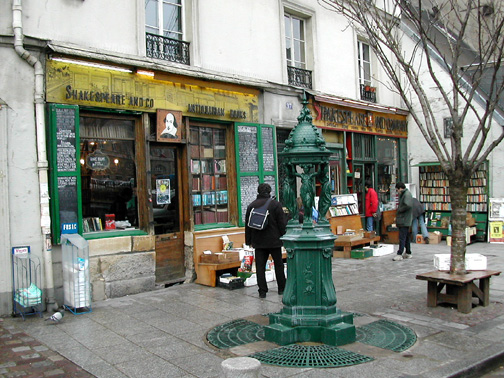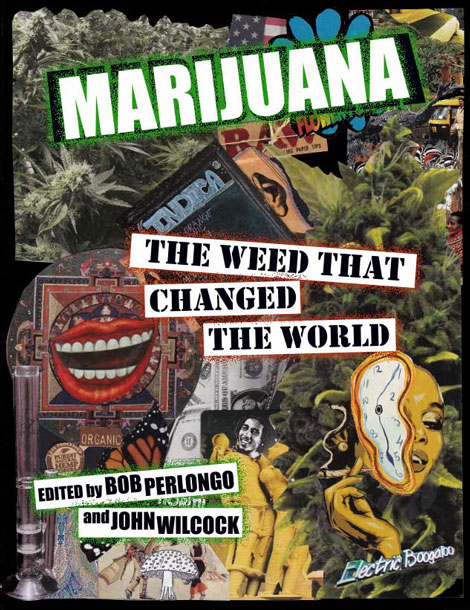
The Column of Lasting Insignificance: March 15, 2014
by John Wilcock

TWENTY YEARS AGO this month was the death of the revered writer Charles Bukowski, the California poet and novelist whose earliest appreciation came from the underground press in the Sixties. Time magazine once tagged him a “laureate of American lowlife” and he was the proud victim of an FBI investigation whose personnel were avid readers of his serialized Notes of a Dirty Old Man. Bukowski’s work appeared in Other Scenes, my ‘60s tabloid, along with dozens of other rags, all of which delighted in his matter-of-fact tales of ordinary folk.
This week, his anniversary is being celebrated by Europe’s legendary bookstore, Shakespeare & Co. in Paris. “What a perfect excuse to praise one of the greatest, most honest, most controversial American poets and novelists who ever lived,” the bookstore notes. “You’re all invited to come on stage and share your favorite poem or lines.” Shakespeare & Co., pictured above and formerly Le Mistral, was owned by George Whitman and over the years has given shelter to hundreds of visiting artists and writers (including myself). It took its name eponymously from an earlier incarnation, operated by Sylva Beach who, similarly, played host to Ezra Pound, Ernest Hemingway, and James Joyce. It was due to continued agitation by Ms. Beach that Joyce’s Ulysses first found a publisher.
TEN YEARS EDITING the innovative magazine Wired, and working for the renowned Economist before that, certainly gave Chris Anderson some heavy credentials. Then, four years ago, justifying his earlier nomination as one of the world’s most influential people, he became self-employed, heading south of the border to found 3D Robotics, one of the earliest drone companies, establishing his manufacturing in Tijuana and headquarters in Berkeley. In a recent Popular Mechanics, he revealed that it all began for him with the purchase of an early 3D home-printing kit which started a revolution in manufacturing, allowing amateurs to handle processes that once required trained toolmakers. In effect, virtually anybody can start a small company and grow it into a big one. Talking of the 3D desktop printer, he explained, “You’d be surprised at how much of the manufacturing process can be done at this scale… Several thousand parts can be produced in a few days by someone with no special skills (its cost) as little as 1 or 2 per cent of what professional production would cost.”
TOUGH LOVE BY THE BOSS can definitely be a good thing — just as long as her/she doesn’t overdo it. That’s the advice from Inc. which suggests that the tough taskmaster of old seems to be a dying breed. “Rather than touting the structure and discipline of their companies, founders these days seem more interested in flaunting their quirks and perks.” Research shows that tough love can be an effective form of leadership, the mag avers, provided one strikes the proper balance between tough and love. Christine Porath, a professor at Georgetown University’s McDonough School of Business, warns: You never want to use fear as your primary motivator. Even if it makes employees want to perform better, they can’t.”
AS MORE BUSINESSES shift online, hackers have plenty of targets to aim at points out the Economist, bringing us the saga of the Knowledge Consulting Group which spends most of its time trying to work into clients’ computer systems to assess how vulnerable they are. “We’re getting in almost every time,” says the Group’s head, Andrew Whitaker, referring significantly to the software that controls critical infrastructure such as water and power supplies. Stolen user names, encrypted passwords, and email addresses are apparently all easy targets to hackers who know what they are doing, with one popular trick — the sending of fake phishing emails, making requests that appear to be from legitimate sources. Countering such attacks is the practice known as ‘penetration testing’ (pentests) which smart companies use or commission because they believe that outsiders can spot things that internal security teams miss.
LIFE WITHOUT PAROLE is a sentence being served by at least 3,200 people for non-violent offences, reports the ACLU, with almost 80% of them for drug crimes. Most of these sentences were mandatory, not allowing the judge any alternative no matter how much mercy might be warranted. It will hardly be surprising to learn that blacks are 20 times more likely than whites, among non-violent life-without-parole prisoners in federal jails: 91% of them in Louisiana, 70% in Mississippi, 68% in South Carolina. “Long sentences have not made drugs harder to buy or Americans less likely to get high,” says the Economist. “Evidence that they reduce crime is skimpy; the vast sums spent on them would surely reduce crime more if spent instead on detective work, drug treatment, and rehabilitation.”
“AUTHENTICITY IS EVERYTHING TODAY, and bourbon, with its long history and made-in-America honesty, is as authentic as it gets” declares Fortune explaining why the famous sour mash — a legal requirement in Tennessee whiskey — is making a comeback. (Sour mash — a mixture of grain, malt, and water — contains a partly fermented mix with some yeast whose working together to create lactic acid is what gives bourbon its distinctive taste.) “This is probably the best time to be in bourbon since Prohibition,” says Brown-Forman’s Tim DeLong who supervises Jack Daniels’ and Woodford Reserve. His rival, Jim Beam, has just been bought by the Japanese Suntory distiller for $16bn. And scores of new entrants are hoping to cash in on the boom with domestic whiskey sales leaping by 40% in recent years and the number of craft distilleries from 24 to 430 in the past decade. “In the ‘70s and ‘80s,” says Eric Gregory, president of the Kentucky Distillers Association, “bourbon was your father’s drink, or worse, your grandfather’s drink. But it’s not just a drink anymore — it’s part of the culture.”
ART FOR THE OFFICE, or even the home, can now be rented, and changed every month if required, with the arrival of Art Remba, a New York company that has partnered with nine city galleries and several artist studios. “A lot of people I know have fabulous apartments and completely empty walls,” Art Remba’s founder Nahema Mehta, told Bloomberg Businessweek. “Our whole impetus is, once it’s on your wall, you can feel more comfortable about starting to collect. The most expensive canvas currently on rental ($500 per month) sells for $150,000, but most artworks are in the under-$2,000 range, with rents as low as $50. Galleries and artists get as much as 50% of the fees.
THE WILCOCK WEB: In moving troops into the Crimea, Russia was predictably protecting its own people, but the US reacted with suspicious overkill, almost as if it was seeking an excuse to revive the Cold War…. It seems that the only thing that the dozens of Indian casinos have in common is jealousy about each other’s gambling greed and how to block it… Fryscraper is the catchy term for those recent glassy highrises — London’s Walkie Talkie, Las Vegas’ Vdara Hotel, Frank Gehry’s Walt Disney Concert Hall) whose reflective concave, structures focus the sun so precisely that they have melted cars caught in their glare… Once overpaid lawyers join the one per cent, you’d think that some sense of obligatory decency would compel them to offer their services more often as public defenders…. “The comfort of the rich,” declared Voltaire, “depends upon an abundant supply of the poor”….Popular Science columnist Virginia Hughes says some European countries recycle up to 50% of the heat generated from making electricity so why do US companies waste most of it?……. Greenpoint Technologies says it already has one customer (price: “tens of millions of dollars”) for its new Aerolift to whisk billionaires into their private jet without having to climb steps. But it needs another order to make it worth building them….. Immigration proponents in South Carolina cheered a court decision relieving police of the obligation to check immigration papers, claiming that doing so was “police misconduct”…. A Daily Telegraph story about the Lego company, still based in the Danish town of Billund, revealed that there are 86 Lego bricks for every person on earth….. Responding to the increasing number of beer drinkers in their ‘20s who have been shifting to spirits, the big brewers are creating stronger beers, first Anheuser Busch’s Black Crown with 6% alcohol and now Miller’s Fortune with 6.9% in a stand-out black bottle that resembles vodka. Alcohol content of most widely distributed beers in the $30bn industry has been 4-5% alcohol….The relationship between California’s GOP gubernatorial aspirant Tim Donnelly and his guns is likely to end badly….… This is the 70th anniversary of the admirable Heifer organization (Heifer.com) which began with a shipment of cows to feed starving children in war-torn Europe, and now allows anyone anywhere to donate a cow (horse, pig, goat) to a poor family anywhere….The British version of Readers Digest, bought by an investment company for $20m a few years ago, was just sold for $2 to new owners who think they can revive it…..Junk & Disorderly, a used-items store in Chesterfield, won the title of Best Punning Name for a store in England (runner-up: Pane in the Glass for a window store)….“Selling your body is better than selling your soul,” was the angry response to government critics who tried to crack down on Dongguan, widely known as China’s Sin City for its multitude of brothels… …. The latest model of the lifeboat is built to survive tsunamis, capable of righting itself after capsizing and holding safely up to 35 people with adequate supplies for a week… Two hundred years ago this month, an alliance of European countries captured Paris and overthrew Napoleon…. “I believe there is something out there watching us. Unfortunately, it’s the government.” — Woody Allen (1935– )
it’s here…

